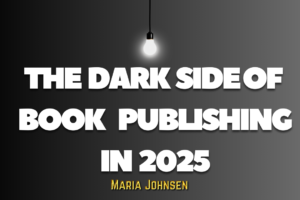The Dark Side of Book Publishing

The Dark Side of Book Publishing
Dark Side of Book Publishing: Beware of hidden fees, vanity presses, and fake reviews that can trap authors into unfair deals. So, you’ve written your book, and you’re ready to see it in print. You search for publishers, maybe even consider self-publishing, and it all seems like a dream come true. But what if I told you that some publishers don’t have your best interests at heart? Unfortunately, there are some shady practices in the publishing world that can leave authors feeling taken advantage of.
Let’s talk about a few of the most common deceptive book publishing practices you need to be aware of.
Vanity Presses
Vanity presses are publishers that charge authors to publish their work. Sounds harmless, right? After all, who wouldn’t want to see their book in print? But here’s the catch – vanity presses often promise authors a publishing experience that sounds too good to be true. They’ll claim they’ll handle everything for you: editing, design, distribution. In reality, these companies usually don’t do much more than print your book and slap a cover on it. Worse, they might charge hefty fees for “services” that don’t add much value.
These publishers often prey on first-time authors who are eager to see their work published, only to take their money without providing any of the marketing or distribution support that a legitimate publisher would offer.
Hidden Fees
Some publishers will give you a great offer up front—low-cost publishing or “no upfront fees.” But once you’ve signed the dotted line, surprise! They start adding hidden costs. Maybe you’ll need to pay extra for things like editing, cover design, formatting, or even basic marketing. These unexpected charges can pile up fast, leaving you with a financial headache and an underwhelming book deal.
If you’re dealing with a publisher, always ask for a clear breakdown of all costs before you sign anything. Transparency is key.
Unrealistic Royalty Percentages
It’s common for authors to get a small percentage of the profits from their books, but some publishers go above and beyond to keep the lion’s share for themselves. Some shady publishers will offer a royalty percentage that looks good at first glance, but when you read the fine print, you’ll discover that your royalty is based on the publisher’s “net” sales, not the gross sales. What does this mean for you? It means the publisher gets to deduct a bunch of expenses (like marketing and distribution costs) before calculating your cut, often leaving you with pennies on the dollar.
A legit publisher will offer reasonable royalty terms that are fair and transparent. Always make sure you fully understand how your earnings will be calculated.
“Author Subsidy” Deals
This one’s pretty common in the self-publishing world. Some companies will offer “traditional publishing deals” that are really just thinly disguised vanity press deals. They’ll promise you the moon, saying things like, “We’ll help you get your book into bookstores and on major retail sites.” But when it comes down to it, these “traditional” publishers will ask you to pay for the privilege of being “published.” You might get a shiny book cover, but you’re responsible for all the marketing and promotion. Not exactly what you’d expect from a traditional publisher, right?
Lack of Distribution
Some publishers claim they’ll distribute your book to major platforms like Amazon, Barnes & Noble, and other retailers, but many end up not delivering on that promise. You might end up with your book sitting in a warehouse, collecting dust, instead of being available where it matters. Even worse, some publishers may try to sell you a book deal where you have to pay for distribution services that don’t actually exist.
Before you sign with a publisher, double-check their distribution channels. A good publisher should have a solid plan to get your book in front of readers, not just the promise of it.
Fake Reviews and “Guaranteed” Bestseller Status
Some publishers go to extreme lengths to make you think your book is a hit. They might offer fake reviews or promise to get your book on bestseller lists for a price. These “bestseller” lists are often based on artificial sales numbers (which you’re paying for), not organic success. So, what happens? You pay a lot of money to get a shiny “bestseller” title, but it doesn’t mean your book is actually selling or resonating with readers. In the end, all you’re left with is a meaningless title and a lot of wasted money.
Real success comes from building a dedicated reader base, not from fake accolades.
Exclusivity Clauses That Trap You
Some publishers might try to lock you into long-term contracts that tie you down for years or give them exclusive rights to your book without offering you much in return. They might promise a great deal upfront, but once you’ve signed, they can restrict you from publishing elsewhere, making it hard for you to get the best possible deal.
Make sure to read through contracts carefully and make sure you’re not committing to something that could lock you in for far longer than you’re comfortable with.
Read this article Book cloning exposed
